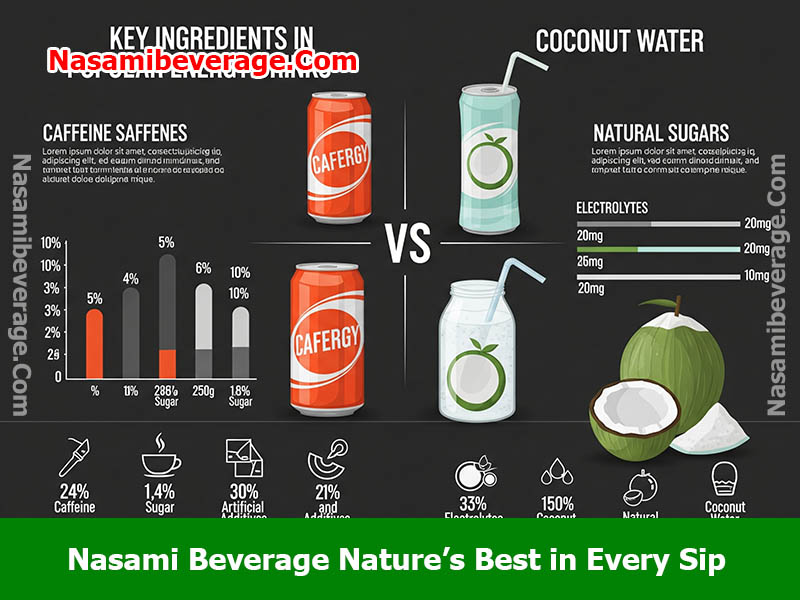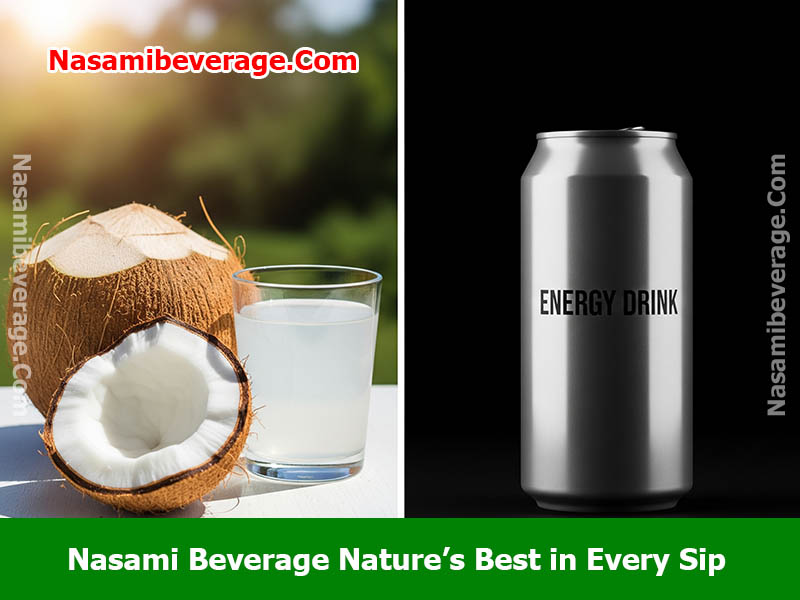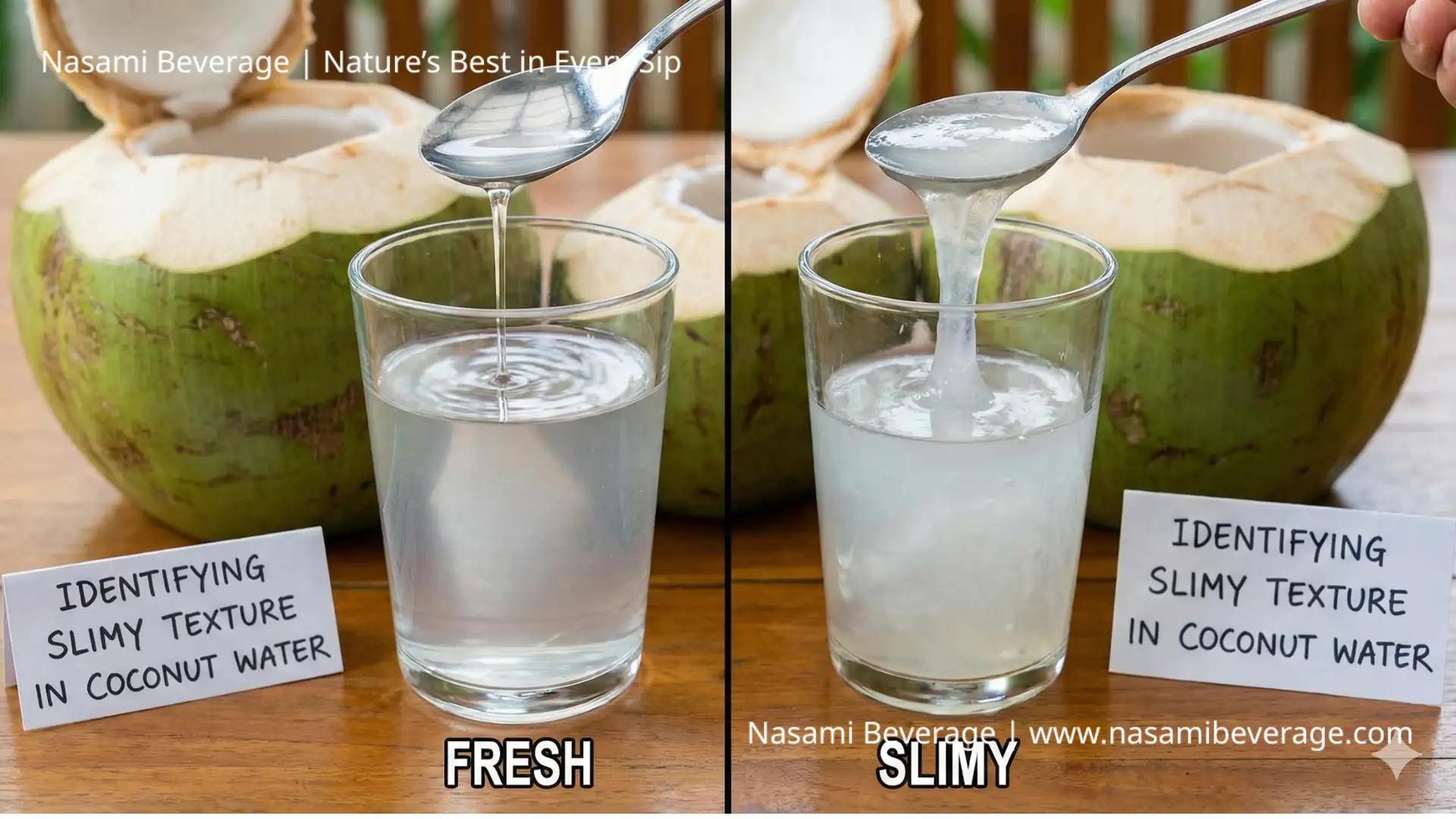In our fast paced world, the quest for an energy boost is common. Many turn to convenient canned beverages, often facing a choice that pits natural refreshment against potent stimulation: coconut water vs energy drinks. While both might promise to lift your spirits and enhance performance, they are fundamentally different in their composition, how they affect the body, and their overall health implications. This article will dissect these differences, exploring what goes into each drink, the nature of the energy they provide, and the crucial health considerations to help you decide which beverage, if any, truly powers you better for the long haul.
Decoding the drinks: What’s inside the can (or coconut)?
Understanding the ingredient list is the first step in making an informed choice between these two vastly different options.
Coconut water: Nature’s refreshing hydrator
Coconut water is the naturally occurring liquid found inside young, green coconuts. It is revered for its hydrating properties and natural nutrient profile.
The primary components of pure coconut water include water (around 94%), natural sugars (like glucose and fructose), and a significant array of electrolytes; indeed, if you wonder does coconut water have electrolytes, the answer is a resounding yes, most notably potassium, magnesium, sodium, and calcium. It also contains small amounts of B vitamins, vitamin C, cytokinins (plant hormones with potential health benefits), and lauric acid.
Ideally, coconut water is consumed fresh from the coconut. Commercially available options undergo minimal processing, often pasteurization, to ensure safety and shelf stability. The best brands offer pure coconut water without added sugars or flavorings, maintaining its close to natural state.
Energy drinks: A cocktail of stimulants and synthetics
Energy drinks are manufactured beverages designed to provide a significant, often immediate, boost in energy and mental alertness. Their formulations are complex and typically rely on a blend of stimulants and other synthetic ingredients.

The cornerstone of most energy drinks is caffeine, often in high concentrations. Many also contain other stimulants like taurine (an amino acid that can affect muscle function and nerve signaling), guarana (a plant extract containing caffeine), and ginseng (an herb believed to enhance physical and mental energy). The synergistic effect of these stimulants can be intense.
A large number of energy drinks are laden with sugar, sometimes exceeding 40-60 grams per serving, contributing to their energy provision but also to a subsequent crash. To offer lower calorie versions, manufacturers often use artificial sweeteners like aspartame, sucralose, or acesulfame potassium, which come with their own set of health debates.
To enhance appeal and extend shelf life, energy drinks frequently contain artificial colorings, flavorings, B vitamins (often in synthetic forms and high doses, marketed as energy enhancers), and preservatives. The long term impact of consuming this cocktail of chemicals is a growing concern.
The energy effect: Natural sustenance vs. artificial jolt
The way these beverages deliver energy is fundamentally different, impacting how you feel both immediately and in the hours that follow.
How coconut water provides a gentle lift
Coconut water offers a more subtle and sustainable form of energy, primarily by addressing hydration and providing easily digestible natural sugars.
Dehydration is a common cause of fatigue and reduced cognitive function. Coconut water, being an excellent hydrator due to its water and electrolyte content, effectively answers the question ‘does coconut water help with hydration‘ positively, leading to a natural feeling of increased energy and well being.
The natural sugars in coconut water provide a quick but not overwhelming source of fuel for the body and brain. This can help improve energy levels without the drastic spikes and crashes associated with highly processed sugars.
Electrolytes like potassium and magnesium are crucial for muscle function, nerve transmission, and overall energy metabolism. By replenishing these, coconut water supports the body’s natural energy production pathways.
The energy drink mechanism: Borrowed energy and its consequences
Energy drinks typically provide a powerful, but temporary, surge of perceived energy by stimulating the central nervous system.

The high doses of caffeine and other stimulants in energy drinks can lead to a rapid increase in alertness, improved reaction time, and a heightened sense of focus. This is the “buzz” that many users seek.
This artificial high is often followed by a “crash” as the effects of the stimulants wear off, leaving the individual feeling more tired, irritable, and depleted than before. This can lead to a cycle of dependence, where more energy drinks are consumed to combat the crash and regain the initial feeling of alertness.
Regular consumption of high levels of stimulants can put significant strain on the adrenal glands and the nervous system. Over time, this can lead to adrenal fatigue, increased anxiety, and other stress related health issues.
Health implications: The good, the bad, and the ugly
The long term health impacts of regularly consuming coconut water versus energy drinks are starkly different.
Benefits and wholesomeness of coconut water
Coconut water is generally considered a healthy beverage when consumed in moderation as part of a balanced diet, with the advantages of drinking coconut water being numerous.
Its natural composition makes it highly effective for rehydration, especially after mild to moderate exercise or in hot weather. It helps replenish fluids and essential minerals lost through sweat.
Compared to sugary sodas and many energy drinks, pure coconut water is relatively low in calories, and understanding how many calories in coconut water highlights its benefits for weight management and overall health as it contains only natural sugars.
Being a natural product, pure coconut water is free from the artificial colors, flavors, sweeteners, and preservatives found in many processed beverages, including energy drinks.
Potential dangers and side effects of energy drinks
The list of potential health risks associated with regular and high consumption of energy drinks is extensive and well documented.

The stimulants in energy drinks can cause a significant increase in heart rate (tachycardia), palpitations, and elevated blood pressure. This can be particularly dangerous for individuals with pre existing heart conditions and has been linked to serious cardiovascular events.
High caffeine intake and other stimulants can trigger or worsen anxiety, cause jitters and restlessness, disrupt sleep patterns leading to insomnia, and result in frequent headaches, especially during withdrawal.
The high sugar content contributes to an increased risk of type 2 diabetes, weight gain, and obesity. The acidity and sugar also promote dental erosion and cavities.
Regular users can develop a physical and psychological dependence on energy drinks. Attempting to quit or reduce consumption can lead to withdrawal symptoms such as severe headaches, fatigue, irritability, and difficulty concentrating.
Making an informed choice: When and why to choose coconut water
Given the health considerations, coconut water emerges as a significantly safer and more beneficial option in most scenarios.
For everyday hydration and a natural pick-me-up
Coconut water is an excellent choice for daily hydration needs and can provide a gentle, natural lift in energy without the adverse effects of stimulants. It is refreshing and helps maintain electrolyte balance.
As a healthier pre or post workout drink (for some activities)
For light to moderate exercise, coconut water can be a good source of hydration and electrolytes. While it might not offer the same carbohydrate load as sports drinks for intense endurance activities, many question is coconut water good for athletes, and for lighter activities, it is a far healthier choice than an energy drink.

For those sensitive to caffeine or artificial stimulants
Individuals who are sensitive to caffeine or wish to avoid artificial stimulants, sweeteners, and colors will find coconut water to be a suitable and beneficial beverage.
As a safe alternative for younger individuals
Due to the significant health risks, energy drinks are particularly discouraged for children and adolescents. Coconut water, in its pure form, offers a much safer way for them to hydrate and enjoy a naturally sweet drink.
When are energy drinks ever considered? (And their precautions)
While the risks are clear, some individuals may still opt for energy drinks in specific situations.
Rare occasions and specific demands (Acknowledging use)
Some might use energy drinks for an occasional, short term boost during demanding tasks like late night study sessions or long drives. However, this should be infrequent and not a regular habit.
Understanding serving sizes and caffeine limits
If consumed, it is crucial to be aware of the serving size (many cans contain two or more servings) and the total caffeine content. Health authorities recommend limiting caffeine intake, and these drinks can easily exceed daily safe limits, especially if multiple are consumed or if other caffeinated products are also used.
Who should absolutely avoid energy drinks?
Individuals with heart conditions, high blood pressure, anxiety disorders, those who are pregnant or breastfeeding, children, and adolescents should avoid energy drinks entirely.
Beyond the buzz: Cultivating sustainable energy naturally
True, lasting energy doesn’t come from a can. It is cultivated through healthy lifestyle habits. As Leigh Hunt aptly put it, “The groundwork for all happiness is good health,” which in turn fuels our natural energy.
Prioritizing sleep and stress management
Adequate, quality sleep is fundamental for energy restoration. Effective stress management techniques also play a crucial role in maintaining energy levels and preventing burnout.
Balanced nutrition for consistent energy levels
A diet rich in whole foods, including fruits, vegetables, lean proteins, and complex carbohydrates, provides a steady supply of nutrients essential for sustained energy production.
Regular physical activity
While it might seem counterintuitive, regular exercise actually boosts energy levels in the long run by improving cardiovascular health, increasing metabolism, and enhancing mood.
Frequently asked questions (FAQs)
Does coconut water contain caffeine like energy drinks do?
No, natural coconut water is caffeine free. Energy drinks, on the other hand, typically contain high levels of caffeine as one of their primary stimulants.
Can coconut water give you the same kind of energy boost as an energy drink?
Coconut water provides a more natural and gentle energy lift, primarily through hydration and its natural sugars, rather than the intense, stimulant driven rush from an energy drink. It won’t produce the same jolt but offers sustained energy without the negative side effects.
Are there any side effects to drinking too much coconut water compared to energy drinks?
While generally safe, drinking excessive amounts of coconut water could lead to an overconsumption of calories and sugar (though natural) and potentially high potassium levels for individuals with kidney issues. However, these side effects are far less severe and common than the numerous and significant health risks associated with energy drink consumption, such as cardiovascular problems, anxiety, and dependence.
Is it safe for teenagers to drink coconut water as an alternative to energy drinks?
Yes, pure coconut water is a much safer and healthier alternative for teenagers compared to energy drinks. Energy drinks are strongly discouraged for adolescents due to their high stimulant content and potential health risks.
In the coconut water vs energy drinks debate, the choice for health and sustainable well being is clear. Coconut water offers natural hydration and a gentle energy lift derived from its inherent nutrients. Energy drinks, conversely, provide an artificial jolt fraught with potential health risks and the likelihood of a subsequent crash. Prioritizing natural sources of energy and healthy lifestyle practices will always serve you better than relying on a temporary, synthetic buzz. For further exploration of healthy beverage options, consider resources like Nasami Beverage.



